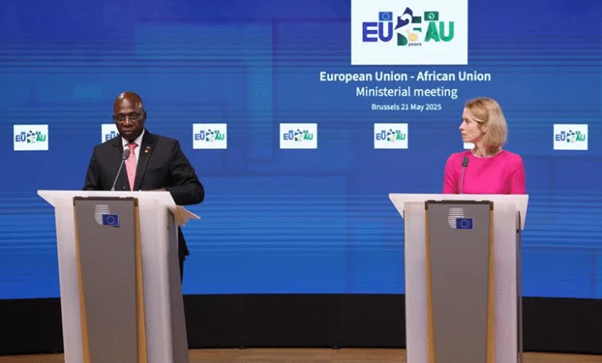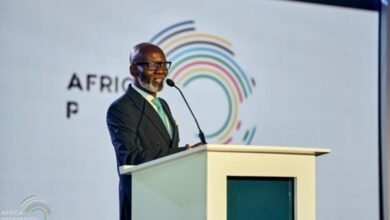EU‑AU Summit in Luanda : renewed ambitions in Europe–Africa cooperation
On 24 and 25 November 2025, Luanda will host the 7th summit between the European Union (EU) and the African Union (AU). Marking 25 years of partnership, leaders from both continents intend to redefine their cooperation in strategic areas such as peace, trade, health, and multilateralism. Analysis.

The summit is jointly chaired by Angolan President João Lourenço and European Council President António Costa. The EU will also be represented by Ursula von der Leyen, President of the European Commission, while the African Union will be represented by Mahmoud Ali Youssouf, Chairperson of the AU Commission.
This event carries symbolic weight: 25 years of EU–AU partnership, first formalized at the Cairo Summit in 2000.
Our objective for this historic summit is the pursuit of a strong, balanced, forward‑looking EU–Africa partnership
António Costa declared, “Our objective for this historic summit is the pursuit of a strong, balanced, forward‑looking EU–Africa partnership. The EU remains a reliable, predictable partner for Africa. Together, we can address global challenges and unlock shared opportunities.”
He further added, “The challenges we face today – climate change, digital transformation, migration, security – know no borders. The response to this multipolar world must be multipolar cooperation. Europe and Africa are bound by a unique partnership — robust, dynamic, designed to face our challenges together while unleashing a new prosperity across both continents.”
These words underline the summit’s main stake: to transform the traditional partnership into a truly strategic and economic one, where Africa is no longer merely a recipient but a full-fledged actor.
The Global Gateway: A Major Economic Lever
The EU–Africa partnership is now undergoing a deep strategic shift. Historically based on development aid, it is increasingly built on sustainable investment, focused on economic cooperation, infrastructure, technology, and green and digital transitions. At the heart of this reorientation is the Global Gateway, a vast program of at least €150 billion, aiming to fund digital infrastructure, energy, transport, as well as sectors like health, education, and research. It stands as a concrete pillar of renewed economic cooperation, illustrating a clear ambition to move from diplomatic promises to real, on-the-ground action.
This partnership is being reoriented around investment, designed to generate mutual benefits and to strengthen the economic sovereignty of African countries. Europeans seek to build a credible and strategic cooperation, aligned with their social and environmental standards, and to maximize the global impact of their investments. Africans, for their part, aspire to more balanced partnerships—ones that support industrialization, create jobs, modernize infrastructure, and guarantee their autonomy and active participation in governance.
Africa must no longer react — it must propose, initiate, and guide
Mahmoud Ali Youssouf, Chairperson of the African Union Commission, has stated: “Africa must no longer react — it must propose, initiate, and guide. This is the Pan‑Africanism of solutions. … Africa will not resign — it will act, invest, and assume its destiny.”
This declaration expresses Africa’s aspiration for a partnership based on responsibility, equity, and shared vision.
Thus, the Global Gateway appears as a key instrument to translate these ambitions into tangible actions, supporting major projects that combine economic development with capacity building. However, the success of this partnership depends on the ability to turn these financial commitments into concrete, sustainable plans, while ensuring transparency and genuine involvement of the populations concerned.






